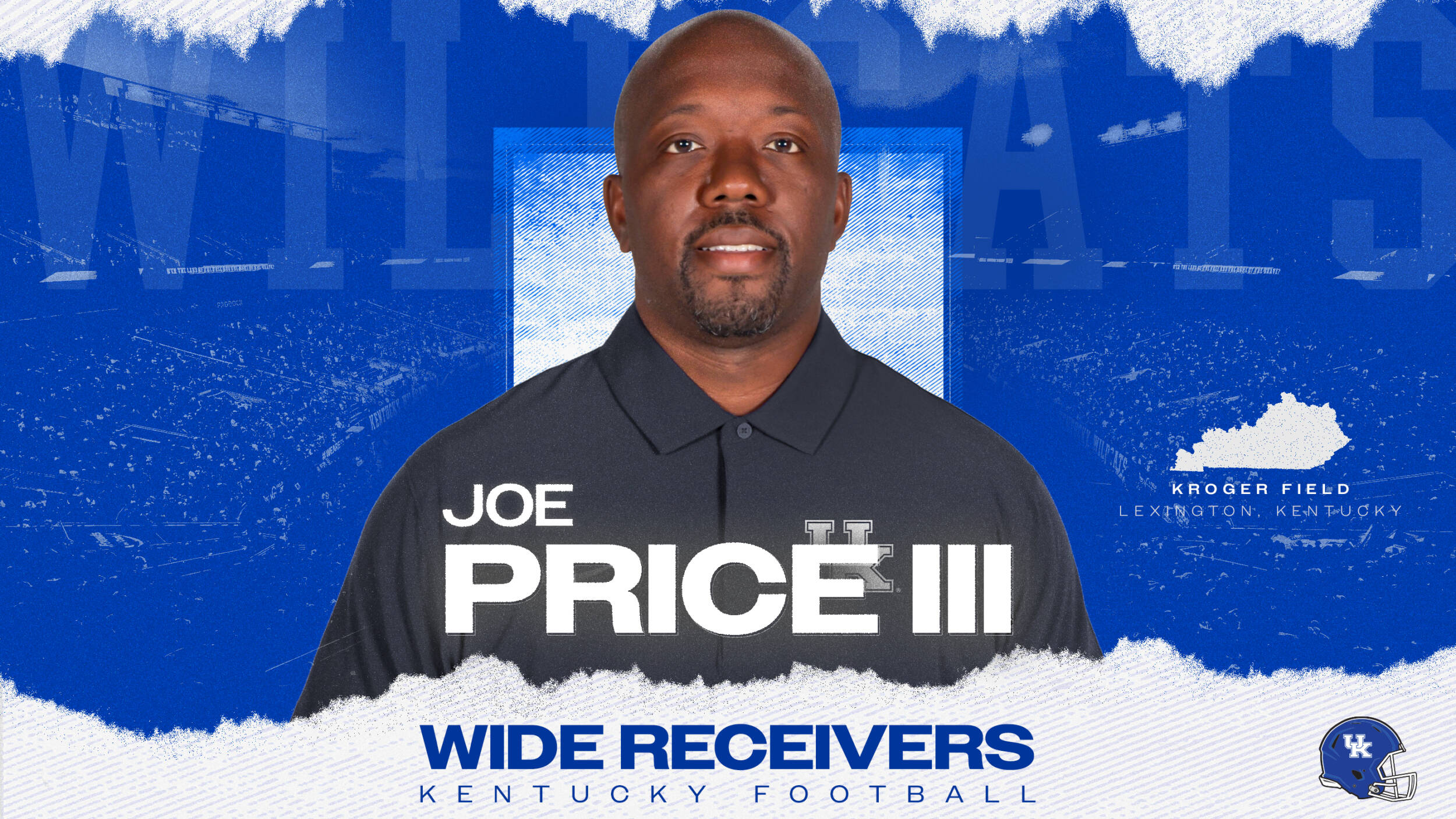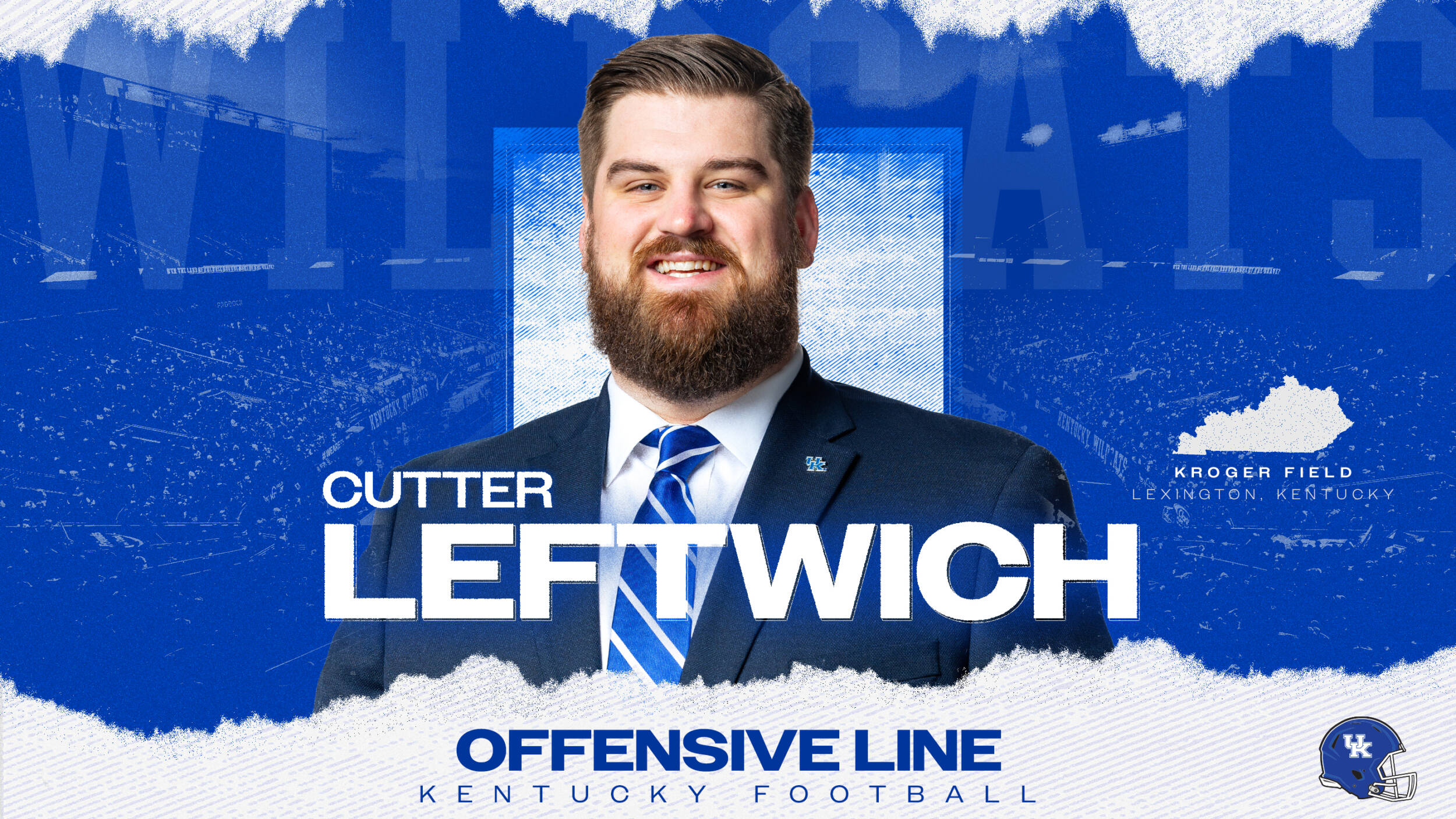Dec. 30, 2002
Rich Brooks, the 1994 National Coach of the Year at the University of Oregon and a former head coach in the National Football League, is the new head coach at the University of Kentucky, director of athletics Mitch Barnhart has announced. The appointment is pending approval by the UK Athletics Association Board of Directors.
Brooks has 27 years of coaching experience on the collegiate level, including a groundbreaking 18-year term as head coach at Oregon, and is a 10-year NFL coaching veteran.
His most recent coaching assignment was the assistant head coach and defensive coordinator position for the Atlanta Falcons from 1997-2000. The 1998 campaign was the most successful in Falcons’ history. With Brooks’ defense generating a league-leading 44 takeaways, Atlanta advanced to its only Super Bowl appearance in franchise history.
Late in the ’98 season, Brooks took over the team when head coach Dan Reeves developed health problems. Brooks was the interim head coach for the final two games of the regular season, and the Falcons’ two wins clinched the division championship and home field advantage in the divisional round of the playoffs. Reeves returned to the sidelines during the playoff games.
Brooks was head coach of the St. Louis Rams in 1995-96. The Rams had a 13-19 record in those two seasons, the team’s best two-year stretch since 1989-90. The Rams won only nine games in the two years prior to his arrival and won just nine games in the two years following his departure.
As head coach at the University of Oregon from 1977-94, Brooks won more games than any coach in school history. After taking over a downtrodden program in ’77, the milestones came steadily:
the Ducks’ 6-5 record in 1979 was the first winning mark since the 1970 season and Brooks was named Pacific-10 Conference Coach of the Year and the District IX Coach of the Year by the American Football Coaches Association; the school also set a record for average home attendance, the first of four times that mark was shattered under Brooks’ leadership;back-to-back winning seasons in 1979-80 was the first time that feat had been accomplished in 16 years;
Oregon reached the national rankings during the 1987 season for the first time in 17 years;
Oregon defeated Tulsa in the 1989 Independence Bowl, the Ducks’ first bowl berth and eight-win season in 26 years;
Oregon followed with a bid to the 1990 Freedom Bowl, the first back-to-back bowl berths in school history;
Oregon returned to the Independence Bowl in 1992;
the 1994 season was Brooks’ best; the Ducks captured nine wins, the most since 1948; won the Pacific-10 championship and played in the Rose Bowl for the first time in 37 seasons; Brooks won the Bear Bryant Award as the National Coach of the Year by the Football Writers Association of America, was chosen the Pac-10 Coach of the Year, and became the first coach in school history to take the Ducks to four bowl games.
Additional achievements at Oregon included Brooks’ sterling 14-3-1 record against arch-rival Oregon State in the annual game known as the “Civil War.” Oregon also broke various attendance records in six consecutive years from 1987-92, including marks for total home attendance, average home attendance, and single-game attendance. His final 18-year record was 91-109-4, including 39-32 and four bowls in the last six seasons.
Brooks coached many of the top players in school history. When he left the school after the ’94 season, he had coached the top three passers in school history, including future NFL performers Chris Miller and Bill Musgrave, and also produced the school’s all-time leading rusher. Brooks’ Oregon teams featured five first-team All-Americans, 32 first-team all-conference performers, two first-team Academic All-Americans, two winners of the Morris Award (emblematic of the top lineman in the Pacific-10), and 39 NFL draft choices.
Brooks also had strong coaching staffs at Oregon. Three former assistants, Mike Bellotti, Bob Toledo, and Bill Maskill, went on to head coaching positions on the collegiate level and several of Brooks’ assistants went on to jobs in the NFL ranks.
In addition to his guidance of the Ducks, Brooks served as a head coach and/or assistant coach in several post-season all-star games, including the East-West Shrine Game, the Blue-Gray Classic, the Senior Bowl, the Hula Bowl, and the Japan Bowl.
Brooks’ combination of administrative skills and coaching acumen prompted the University to offer him the dual role of director of athletics and head football coach, which he performed from 1992-94. In recognition of his numerous contributions to the school, Oregon named its football field “Brooks Field” in his honor in 1995.
Born in Forest, Calif., Brooks competed in football, basketball, track, and boxing at Nevada Union High School in Grass Valley, Calif.
He began his collegiate career at Oregon State from 1959-62 under Coach Tommy Prothro, considered one of the top offensive strategists in the history of football and the man Brooks credits as having the greatest influence on his coaching philosophy.
Brooks was a single-wing tailback on the freshman team, then played defensive back for three years on the varsity. He was a part-time starter as a defensive back as a sophomore, then became a regular starting DB the next two seasons. As a senior, he nabbed five interceptions for a team that went 9-2 and won the Liberty Bowl. He also was a reserve quarterback in addition to playing in the secondary.
He completed his bachelor’s degree in 1963 and stayed in Corvallis to work on his master’s degree and help coach the OSU freshman team. After completing his master’s, Brooks became an assistant coach in 1964 at Norte Del Rio High School in Sacramento, Calif.
In 1965, he returned to his alma mater as an assistant coach. He guided the defensive ends and later the defensive line for a total of five seasons. During that span, OSU had two final rankings in the nation’s top 15, finished second in the Pac-8, and Brooks coached All-Americans Jess Lewis and John Sandstrom.
Brooks rejoined Prothro in 1970 as linebackers coach at UCLA, then moved with Prothro to the NFL’s Los Angeles Rams in 1971-72 as special teams and fundamentals coach. Brooks returned to Oregon State as defensive coordinator in 1973, then went back to the NFL in 1974-75 as defensive backs and special teams coach for the San Francisco 49ers. He coached linebackers at UCLA in 1976, helping the Bruins to a top-20 final ranking, before receiving the head coaching position at Oregon shortly after the season.
Brooks, 61, and his wife, Karen, have four adult children – daughters Kasey and Kerri and sons Denny and Brady – and four grandchildren.
The Brooks File
Born
August 20, 1941, in Forest, Calif.
Education
Nevada Union High School, Grass Valley, Calif. (1958)
Oregon State University, bachelor’s degree in physical education (1963) and master’s in education (1964)
Athletic Experience
Football, basketball, track and boxing at Nevada Union High School
Defensive back/quarterback at Oregon State, 1959-62
Coaching Experience
1963 Oregon State Assistant Freshman Coach1964 Norte Del Rio HS Assistant Coach1965-69 Oregon State Assistant Coach, Defensive Ends and Defensive Line1970 UCLA Assistant Coach, Linebackers1971-72 Los Angeles Rams (NFL) Assistant Coach, Special Teams and Fundamentals1973 Oregon State Assistant Coach, Defensive Coordinator1974-75 San Francisco 49ers (NFL) Assistant Coach, Defensive Backs and Special Teams1976 UCLA Assistant Coach, Linebackers and Special Teams1977-94 Oregon Head Coach1995-96 St. Louis Rams (NFL) Head Coach1997-2000 Atlanta Falcons (NFL) Assistant Head Coach, Defensive Coordinator
Coaching Honors
1979 Pacific-10 Coach of the Year District IX Coach of the Year by the AFCA Slats Gill Award as Sportsman of the Year in the state of Oregon1989 Slats Gill Award as Sportsman of the Year in the state of Oregon1994 National Coach of the Year (Bear Bryant Award) by the FWAA National Coach of the Year by The Sporting News National Coach of the Year by ESPN/Home Depot Pacific-10 Coach of the Year Slats Gill Award as Sportsman of the Year in the state of Oregon1995 Inducted into the Independence Bowl Hall of Fame
What They’re Saying
“The University of Kentucky has hired one of the best football coaches in the game. I have tremendous respect for Rich Brooks. He has very strong technical knowledge in all areas of the game. He’s a good, sound recruiter. His teams were well-conditioned and very difficult to beat.
“One of his strengths is his ability to evaluate and select strong coaches. His track record indicates that he always has hired a very strong coaching staff.
“I’m excited for him and for University of Kentucky football.”
— Terry Donahue, general manager of the San Francisco 49ers and former UCLA head coach
“Coach Brooks has a tremendous desire to win and is one of the most competitive men you’ll ever meet. Every time I play golf with him or have the opportunity to talk with him, you can tell that fire is there and burning. He’s an honest man. He treats players with the utmost respect and he’s a man’s man. He will really care about those kids. I’m thrilled that he’s getting this opportunity and I think he’ll do a great job at Kentucky.”
— Chris Miller, former University of Oregon and NFL quarterback
“His personal conduct through his lengthy coaching career was beyond reproach.”
— Brooks Hatch, sportswriter for the Corvallis Gazette-Times, in an article published Dec. 4, 2002
“I’ve known Rich Brooks for the past 20 years and he’s a mighty easy person to like. He did a fantastic job at Oregon. He has great camaraderie with his players. His coaching style will be an excellent fit at Kentucky. I think there will be a lot of happy Kentucky fans.”
— Bobby Bowden, Florida State head coach
“Rich Brooks is a long time associate in the American Football Coaches Association and is an outstanding leader in our profession. His will to succeed and to be a successful football coach is a well known fact. With his leadership, he will bring the University of Kentucky instant credibility and instant success.”
— Grant Teaff, president of the American Football Coaches Association



